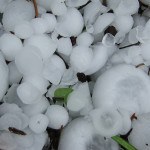OPELIKA, Ala. — Witnessing survivors wear the same clothing days after the March 3 tornadoes, Kaitlyn Willing felt spiritually led to convert her mobile boutique business into the Tornado Relief Clothing Bus.
“Although the storm did not personally affect our home, it affected our family because long-time friends of ours lost their 10-year-old daughter in the tornado,” Willing said. “It rocked us to our core.”
In February 2017, Willing and her husband purchased a school bus to renovate into a pink boutique on wheels, stocked with designer goods and equipped with two changing rooms in the back. But with a fourth son on the way, the bus sat unused in their backyard.
“The Lord put it on my heart to fire it up again and begin bringing clothing to tornado survivors,” Willing said. “I knew Lee County could do better than donating old T-shirts or out-of-style clothing from the back of their closets. A standard was set. We would not accept just any clothing. We would only accept the best, gently-loved items or brand new items with tags.”
Each weekend, Willing drove into the disaster zone, offering survivors quality clothing, shoes and accessories, and from the first day of service, she understood the gravity of the situation.

“Pictures online truly did not do justice to the complete devastation we witnessed as we parked the bus on land where a family’s house once stood,” Willing said. “One of the mothers walked up to me, with tears in her eyes and her children following behind her. Her request was for a pair of jeans for her daughter because she had been wearing the same sweatpants for a week. My heart broke.”
Willing began to see a fascinating contrast between the rubble outside the bus windows and survivors joyfully searching for free, clean, quality clothing as they conversed and laughed. Normalcy had been brought to their lives, Willing explained.
“For a moment, they were able to escape the pure tragedy that surrounded them,” she said. “For a moment, these women could feel normal as they participated in a pampering experience at no cost. Week after week, we continued to set up shop in the very same spot on Lee Road 38, and I began to truly build relationships with the women that had survived the tornadoes.”
As the Tornado Relief Clothing Bus continues to serve the community, Willing is in need of volunteers like Hannah Whitecotton to sort, hang and distribute clothing to survivors who are rebuilding their homes and restocking their closets.
“The first time we went out there I got to go and help get the ladies set up with what they wanted, show them around and show them where the sizes were,” Whitecotton said. “I’ve been trying to go over there a few times a week. Something that’s so important is time and how we manage our time, and I believe we have the option of using time for ourselves or time to pour out to the community and help others.”
According to Willing, Whitecotton shares a sentiment prevalent in many Lee County residents, sacrificing their time and money to assist and comfort survivors.
“The Tornado Relief Clothing Bus would not have been possible without this amazing community,” Willing said. “Hundreds of people have donated the best items from their closets (and) purchased new items. In fact, multiple people from all over the United States have supported Lee County by shipping us boxes of clothing from their closets.”
Local organizations such as The Food Bank of East Alabama, Presbyterian Community Ministry, Wetumpka Sisters in Christ and the Auburn Rotary Club have collaborated with Willing to ensure tornado victims receive all their necessities.
“We have become a stable resource for the area,” Willing said. “Survivors can confidently know we are coming and can trust us. As they began to trust me, they shared the horrific stories of their experiences during and after the violent tornadoes altered their lives. I can honestly say, I am honored to know these women, and it brings me joy to spend time with them each weekend.”
As a volunteer serving after a disaster, Whitecotton said there is an observable trend of a quick response without ongoing assistance.
“It’s common when things like this happen to see people just jump on it right away, and as soon as it happens, there’s so many donations and things happening,” she said. “One of the important things to remember is this is going to go on for months and years for these people that are affected by it. They are not just going to recover in the next two months.”
Willing shared her concern for a steadily growing lack of volunteers and donations, and she stressed the need for aid is great.
“My greatest fear is that the Beauregard community will be forgotten about,” she said. “The devastation is real and there is still so much to be done. Although donating a case of waters and a pack of granola bars is a start, it’s not a quick fix. These people have many more needs. As a community, we need to commit ourselves to walking with them through the recovery process until they are no longer in need.”
Was this article valuable?
Here are more articles you may enjoy.

 SC High Court Strikes ‘Troubling’ Denial of Comp Claim, Says Can’t Be Based on Stats
SC High Court Strikes ‘Troubling’ Denial of Comp Claim, Says Can’t Be Based on Stats  Supplemental Claims Don’t Need to Include Damage Estimates, Fed Appeals Court Says
Supplemental Claims Don’t Need to Include Damage Estimates, Fed Appeals Court Says  Viewpoint: The Impact of Behavioral Health on Workers’ Comp
Viewpoint: The Impact of Behavioral Health on Workers’ Comp  Report Using Aerial Imagery Keys in on Hailstorm Risks to Colorado Homes
Report Using Aerial Imagery Keys in on Hailstorm Risks to Colorado Homes 